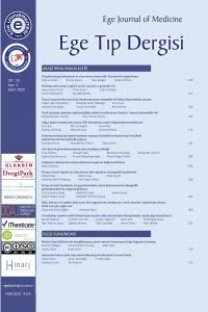Differential activity of tumor necrosis factor-alpha (TNF-alpha) in diabetes mellitus
Trigliseridler, Tümör nekroz faktör, Sitokinler, Obezite, Diabetes mellitus
Triglycerides, Tumor Necrosis Factor, Cytokines, Obesity, Diabetes Mellitus,
- ISSN: 1017-7698
- Yayın Aralığı: Yılda 3 Sayı
- Başlangıç: 2018
- Yayıncı: Ege Üniv. Tıp Fak.
Demet DEVİREN, Can CEYLAN, Taner AKALIN, FATMA SİBEL ALPER, Gülşen KANDİLOĞLU, Fezal ÖZDEMİR
Unusual unilateral agenesis of tarsal and metatarsal bones with pes equinovarus: A case report
AHMET KALAYCIOĞLU, Yusuf AŞIK, Osman AYNACI, M. Ali ÇAN
Differential activity of tumor necrosis factor-alpha (TNF-alpha) in diabetes mellitus
Çiğdem YENİSEY, Ayşin ÖGE, Zait BOLAMAN, Mukadder SERTER
EKİN ÖZGÜR AKTAŞ, Safiye AKTAŞ, Aytaç KOÇAK, Ali YEMİŞCİGİL, Bayram EGE
Splenectomy promotes bacterial translocation
Abdülkadir GENÇ, Coşkun ÖZCAN, Sercan ULUSOY, M. Ali ÖZİNEL, HAKKI ATA ERDENER
Granulomatous interstitial nephritis secondary to drug hypersensitivitiy: A case report
Özbaşlı Çiğdem LEVİ, Harun AKAR, Edi LEVİ, Zahit BOLAMAN, Taşkın ŞENTÜRK
Transarterial catheter chemoembolization in hepatoblastoma: A case report
Abdülkadir GENÇ, Coşkun ÖZCAN, VOLKAN SARPER ERİKCİ, Can TANELİ, Nevra ELMAS, Erol BALIK
